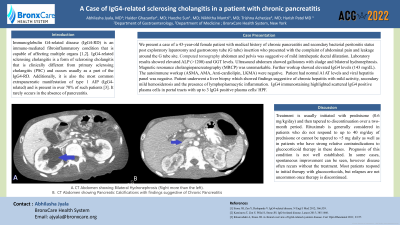Back


Poster Session B - Monday Morning
Category: Biliary/Pancreas
B0042 - A Case of IgG4-Related Sclerosing Cholangitis in a Patient With Chronic Pancreatitis
Monday, October 24, 2022
10:00 AM – 12:00 PM ET
Location: Crown Ballroom

Has Audio
- AJ
Abhilasha Jyala, MD
Bronxcare Health System
Bronx, NY
Presenting Author(s)
Abhilasha Jyala, MD, Haider Ghazanfar, MD, Haozhe Sun, MD, Nikhitha Mantri, MD, Trishna Acherjee, MD, Harish Patel, MD
Bronxcare Health System, Bronx, NY
Introduction: Immunoglobulin G4-related disease (IgG4-RD) is an immune-mediated fibroinflammatory condition that is capable of affecting multiple organs. IgG4-related sclerosing cholangitis is a form of sclerosing cholangitis that is clinically different from primary sclerosing cholangitis (PSC) and occurs usually as a part of the IgG4-RD. Additionally, it is also the most common extrapancreatic manifestation of type 1 AIP (IgG4-related) and is present in over 70% of such patients. It rarely occurs in the absence of pancreatitis.
Case Description/Methods: We present a case of 43-year-old female patient with medical history of chronic pancreatitis and secondary bacterial peritonitis status post exploratory laparotomy and gastrostomy tube (G tube) insertion who presented to with the complaint of abdominal pain and leakage around the G tube site. Computed tomography abdomen and pelvis was suggestive of mild intrahepatic ductal dilatation. Laboratory results showed elevated ALP ( >1200) and GGT levels. Ultrasound abdomen showed gallstones with sludge and bilateral hydronephrosis. Magnetic resonance cholangiopancreatography (MRCP) was unremarkable. Further workup showed elevated IgG4 levels (143 mg/dL). The autoimmune workup (ASMA, AMA, Anti-cardiolipin, LKMA) were negative. Patient had normal A1AT levels and viral hepatitis panel was negative. Patient underwent a liver biopsy which showed findings suggestive of chronic hepatitis with mild activity, secondary mild hemosiderosis and the presence of lymphoplasmacytic inflammation. IgG4 immunostain highlighted scattered lgG4 positive plasma cells in portal tracts
Discussion: Treatment is usually initiated with prednisone (0.6 mg/kg/day) and then tapered to discontinuation over a two-month period. Rituximab is generally considered in patients who do not respond to up to 40 mg/day of prednisone or cannot be tapered to < 5 mg daily as well as in patients who have strong relative contraindications to glucocorticoid therapy in these doses. Prognosis of this condition is not well established. In some cases, spontaneous improvement can be seen, however disease often recurs without the treatment. Most patients respond to initial therapy with glucocorticoids, but relapses are not uncommon once therapy is discontinued.

Disclosures:
Abhilasha Jyala, MD, Haider Ghazanfar, MD, Haozhe Sun, MD, Nikhitha Mantri, MD, Trishna Acherjee, MD, Harish Patel, MD. B0042 - A Case of IgG4-Related Sclerosing Cholangitis in a Patient With Chronic Pancreatitis, ACG 2022 Annual Scientific Meeting Abstracts. Charlotte, NC: American College of Gastroenterology.
Bronxcare Health System, Bronx, NY
Introduction: Immunoglobulin G4-related disease (IgG4-RD) is an immune-mediated fibroinflammatory condition that is capable of affecting multiple organs. IgG4-related sclerosing cholangitis is a form of sclerosing cholangitis that is clinically different from primary sclerosing cholangitis (PSC) and occurs usually as a part of the IgG4-RD. Additionally, it is also the most common extrapancreatic manifestation of type 1 AIP (IgG4-related) and is present in over 70% of such patients. It rarely occurs in the absence of pancreatitis.
Case Description/Methods: We present a case of 43-year-old female patient with medical history of chronic pancreatitis and secondary bacterial peritonitis status post exploratory laparotomy and gastrostomy tube (G tube) insertion who presented to with the complaint of abdominal pain and leakage around the G tube site. Computed tomography abdomen and pelvis was suggestive of mild intrahepatic ductal dilatation. Laboratory results showed elevated ALP ( >1200) and GGT levels. Ultrasound abdomen showed gallstones with sludge and bilateral hydronephrosis. Magnetic resonance cholangiopancreatography (MRCP) was unremarkable. Further workup showed elevated IgG4 levels (143 mg/dL). The autoimmune workup (ASMA, AMA, Anti-cardiolipin, LKMA) were negative. Patient had normal A1AT levels and viral hepatitis panel was negative. Patient underwent a liver biopsy which showed findings suggestive of chronic hepatitis with mild activity, secondary mild hemosiderosis and the presence of lymphoplasmacytic inflammation. IgG4 immunostain highlighted scattered lgG4 positive plasma cells in portal tracts
Discussion: Treatment is usually initiated with prednisone (0.6 mg/kg/day) and then tapered to discontinuation over a two-month period. Rituximab is generally considered in patients who do not respond to up to 40 mg/day of prednisone or cannot be tapered to < 5 mg daily as well as in patients who have strong relative contraindications to glucocorticoid therapy in these doses. Prognosis of this condition is not well established. In some cases, spontaneous improvement can be seen, however disease often recurs without the treatment. Most patients respond to initial therapy with glucocorticoids, but relapses are not uncommon once therapy is discontinued.

Figure: A CT Abdomen showing Bilateral Hydronephrosis (Right more than the left)
B CT Abdomen showing Pancreatic Calcifications with findings suggestive of Chronic Pancreatitis
B CT Abdomen showing Pancreatic Calcifications with findings suggestive of Chronic Pancreatitis
Disclosures:
Abhilasha Jyala indicated no relevant financial relationships.
Haider Ghazanfar indicated no relevant financial relationships.
Haozhe Sun indicated no relevant financial relationships.
Nikhitha Mantri indicated no relevant financial relationships.
Trishna Acherjee indicated no relevant financial relationships.
Harish Patel indicated no relevant financial relationships.
Abhilasha Jyala, MD, Haider Ghazanfar, MD, Haozhe Sun, MD, Nikhitha Mantri, MD, Trishna Acherjee, MD, Harish Patel, MD. B0042 - A Case of IgG4-Related Sclerosing Cholangitis in a Patient With Chronic Pancreatitis, ACG 2022 Annual Scientific Meeting Abstracts. Charlotte, NC: American College of Gastroenterology.
